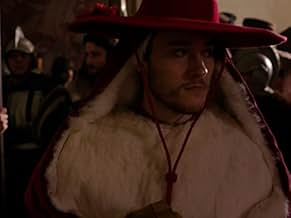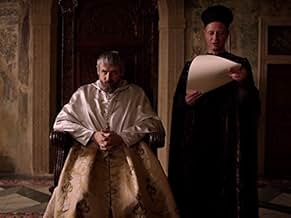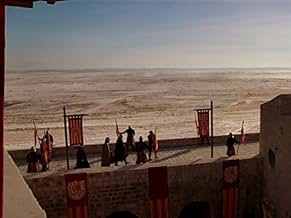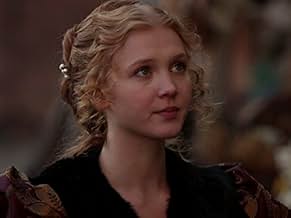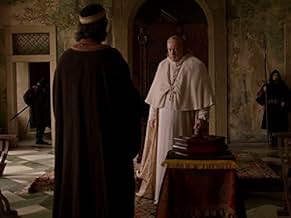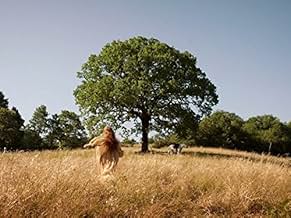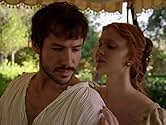Story of the rise and the fall of the Renaissance dynasty.Story of the rise and the fall of the Renaissance dynasty.Story of the rise and the fall of the Renaissance dynasty.
- Awards
- 2 wins & 8 nominations
Browse episodes
Storyline
Did you know
- TriviaNearly all of the principal actors and actresses were using their natural accents (be they American, Russian, Czech, Italian, et cetera) with a few notable exceptions. Mark Ryder (Cesare Borgia) and Diarmuid Noyes (Alessandro Farnese) are Irish but used English accents on the show. Even Stanley Weber (Juan Borgia) moderates his French accent, though he doesn't sound as English as his on-screen brother. This is because the series was intended for dubbing into non-English European languages (French, German, et cetera).
- GoofsA choke pear (called "Pope's pear") is used to torture a convicted homosexual in the 2nd season. Choke pears were unknown before the 17th century, more than 100 years after the show's time frame. 15th century's punishments for pederasty were not so cruel (penalty, branding).
- ConnectionsReferenced in Vsechnopárty: Episode dated 18 March 2016 (2016)
Featured review
This show is probably confusing a lot of people. Showtime just did "The Borgias" with Jeremy Irons, but this isn't it. It is an original production by Canal+, which appears to be like a European version of HBO.
Despite being made by a French company, the show is totally in English, and stars an American. What's most surprising, though, is how tame the Showtime series seems in comparison to this.
Despite being on "Premium Cable" in America, the Showtime series is very TV-14. The violence is tame, the sex is mainly suggested, and there is very little foul language. A few cuts and it could easily air on any network in the US.
"Borgia", on the other hand, feels much more like HBO's groundbreaking series "Rome". The violence is brutal, graphic and unflinching. Sex is frequent, full frontal nudity a matter of fact. I suspect this is an authentic depiction of life in Rome around 1500.
Speaking of "Rome", the first thing I noticed, besides visual similarities, is that Anne Thomopolous is an executive producer. That name seemed very familiar, and sure enough, she was one of the producers of "Rome". I'd call that a good sign.
She's not alone in the behind the scenes talent, two other noteworthy names pop up: Tom Fontana and Barry Levinson. Levinson is a well known Hollywood director, with credits like "Rain Man" and "Sleepers". Fontana is the creator of HBO's "OZ", the first hour long drama produced by that company. One might argue that Fontana invented the "R-rated premium cable TV series" that is so popular now. He paved the way for stuff like The Wire, Rome, Dexter, and The Sopranos.
That's a pretty big talent line up for a European TV series. In terms of name actors, however, this show unfortunately can't compete with Showtime. They have Jeremy Irons playing Borgia, where this show has John Doman.
Doman is a good character actor, and his performance as the sarcastic, mean-spirited police captain in "The Wire" is legendary. That said, he feels very out of place in this otherwise extremely authentic looking show, mainly due to his unapologetic American accent. It's like Kevin Costner as Robin Hood, the producers apparently just decided to suspend disbelief and dump a modern American accent in the middle of the Vatican. You get used to it, but it's a little off-putting at the start.
The kid playing Cesare Borgia is capable, but there are times he seems to be pushing into melodrama territory, particularly any time he gets angry. The guy in the Showtime series was cool as a cucumber, yet viscous and brooding at the same time.
The men at least aren't up to Showtimes standards, but the women are a different story. Lucrezia and Julia Farnese are both much better in this show than Showtime's. Julia is a total sex goddess in this, someone who is used to getting her way by any means necessary. And Lucrezia is her young counterpart, inexperienced but curious. The two women both nail the parts and are totally convincing, more so than the depictions of these characters on Showtime.
I recognized a few other actors, most notably the actor who plays Samwell Tarly in HBO's "Game of Thrones" as a young Cardinal. The "bit parts" are played by unknown Europeans, and are usually great.
I won't spoil the plot, but it is basically the same as "The Borgias": The rise to power of a corrupt pope and his family. Of course, is it based on actual history, so spoilers are easy to come by if you want them. The main difference between the plotting of this show and the Showtime version is that this show manages to remain interesting all the time, where I felt it was somewhat of a struggle to get through the Showtime series. I just didn't care about anyone except Cesare and Rodrigo in the Showtime version, all the other characters were boring.
This version places lesser characters like Julia Farnese and Juan Borgia in the limelight as well, so we actually spend time with them away from the Pope. Additionally, the Showtime series concentrated on the Pope's arch enemy Della Rovre to a much greater degree, where this show seems focused on the family and their friends. I find that to be much more effective, since the enemy is now viewed through their eyes only, the audience is essentially placed on the Borgia side of the table permanently. It's like you're part of the family.
I would highly recommend this to any fan of historical drama, with a special emphasis on HBO's "Rome". This is almost like an unofficial successor to it, it has the same feel of authenticity.
"Borgia" is available on Netflix instant watch, and as far as I know this is currently the only way to see it in the US.
Despite being made by a French company, the show is totally in English, and stars an American. What's most surprising, though, is how tame the Showtime series seems in comparison to this.
Despite being on "Premium Cable" in America, the Showtime series is very TV-14. The violence is tame, the sex is mainly suggested, and there is very little foul language. A few cuts and it could easily air on any network in the US.
"Borgia", on the other hand, feels much more like HBO's groundbreaking series "Rome". The violence is brutal, graphic and unflinching. Sex is frequent, full frontal nudity a matter of fact. I suspect this is an authentic depiction of life in Rome around 1500.
Speaking of "Rome", the first thing I noticed, besides visual similarities, is that Anne Thomopolous is an executive producer. That name seemed very familiar, and sure enough, she was one of the producers of "Rome". I'd call that a good sign.
She's not alone in the behind the scenes talent, two other noteworthy names pop up: Tom Fontana and Barry Levinson. Levinson is a well known Hollywood director, with credits like "Rain Man" and "Sleepers". Fontana is the creator of HBO's "OZ", the first hour long drama produced by that company. One might argue that Fontana invented the "R-rated premium cable TV series" that is so popular now. He paved the way for stuff like The Wire, Rome, Dexter, and The Sopranos.
That's a pretty big talent line up for a European TV series. In terms of name actors, however, this show unfortunately can't compete with Showtime. They have Jeremy Irons playing Borgia, where this show has John Doman.
Doman is a good character actor, and his performance as the sarcastic, mean-spirited police captain in "The Wire" is legendary. That said, he feels very out of place in this otherwise extremely authentic looking show, mainly due to his unapologetic American accent. It's like Kevin Costner as Robin Hood, the producers apparently just decided to suspend disbelief and dump a modern American accent in the middle of the Vatican. You get used to it, but it's a little off-putting at the start.
The kid playing Cesare Borgia is capable, but there are times he seems to be pushing into melodrama territory, particularly any time he gets angry. The guy in the Showtime series was cool as a cucumber, yet viscous and brooding at the same time.
The men at least aren't up to Showtimes standards, but the women are a different story. Lucrezia and Julia Farnese are both much better in this show than Showtime's. Julia is a total sex goddess in this, someone who is used to getting her way by any means necessary. And Lucrezia is her young counterpart, inexperienced but curious. The two women both nail the parts and are totally convincing, more so than the depictions of these characters on Showtime.
I recognized a few other actors, most notably the actor who plays Samwell Tarly in HBO's "Game of Thrones" as a young Cardinal. The "bit parts" are played by unknown Europeans, and are usually great.
I won't spoil the plot, but it is basically the same as "The Borgias": The rise to power of a corrupt pope and his family. Of course, is it based on actual history, so spoilers are easy to come by if you want them. The main difference between the plotting of this show and the Showtime version is that this show manages to remain interesting all the time, where I felt it was somewhat of a struggle to get through the Showtime series. I just didn't care about anyone except Cesare and Rodrigo in the Showtime version, all the other characters were boring.
This version places lesser characters like Julia Farnese and Juan Borgia in the limelight as well, so we actually spend time with them away from the Pope. Additionally, the Showtime series concentrated on the Pope's arch enemy Della Rovre to a much greater degree, where this show seems focused on the family and their friends. I find that to be much more effective, since the enemy is now viewed through their eyes only, the audience is essentially placed on the Borgia side of the table permanently. It's like you're part of the family.
I would highly recommend this to any fan of historical drama, with a special emphasis on HBO's "Rome". This is almost like an unofficial successor to it, it has the same feel of authenticity.
"Borgia" is available on Netflix instant watch, and as far as I know this is currently the only way to see it in the US.
Details
- Runtime52 minutes
- Color
- Sound mix
- Aspect ratio
- 1.78 : 1
- 16:9 HD
Contribute to this page
Suggest an edit or add missing content






